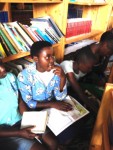Local Non-Profit REAPs Rewards for Children Half a World Away

ago Ed Ballen accompanied his daughter, Rachel, to volunteer at the Hameau des Juenes orphanage in Rwanda’s rural Eastern District. For someone who had long been attracted to working on social justice issues, it didn’t take long for Ballen to return.
He was so moved by the children who longed for better education even amidst crippling poverty that the seed behind the Rwanda Education Assistance Project (REAP) had been planted.
In 2008, Ballen founded REAP, a nonprofit organization, to help raise money for extra programs, supplies and facility enhancements at the Duha Complex School, a large and severely challenged public school not far from the orphanage where that region’s children go to class.
“Rwanda has become a part of my life and we have people who we’re very close to there,” said Ballen, a Katonah clinical social worker with a private practice. “I’m in it for the long haul and I’ve been involved with it since 2006. Sometimes the challenges inspire you, sometimes they defeat you.”
This Saturday evening, REAP’s annual fundraiser will be held at the Katonah Village Library. It will be a three-hour program with hors d’oeuvres and wine and a musical performance by folk rocker Marc Black. In between the food, drink and entertainment, Ballen will help make a presentation about the organization and the cause.
Ballen said this year the event was moved to the library to encourage the local community to get involved as much as possible.
“It very much represents what we do in Rwanda, which is a very, very grassroots organization, so what we tried to do is relate to the grassroots this year and it reflects in many ways a certain mission,” Ballen said.
During the past eight years REAP has supplemented the Rwandan government’s funding at the Duha Complex School to introduce a variety of improvements. The organization has established a computer lab, a library with about 1,000 books, a nearby dairy farm, construction of a community center adjacent to the school and a variety of clubs.
Moving forward, Ballen said he hopes to concentrate on establishing leadership programs at the school, a critical component in education.
In Rwanda, which is still recovering from the 1990s civil war and genocide, any outside donations for public schools must go toward specific programs and not actual instruction since the government prohibits one school from having curriculum advantages over another.
Ballen said he hopes the work REAP has done at this school, which has more than 3,000 students from preschool through 12th grade, will be a model for private donors to do the same with other public schools. The growing number of private schools in Rwanda receive the bulk of outside donations.
Still, the challenges in Rwanda’s public education make problems in American schools seem insignificant. Teachers’ wages remain at poverty level making it difficult to attract stronger talent and some children have to walk an hour each way. First grade alone has 768 children enrolled, creating an average class size of more than 60 students. About six years ago the Rwandan government made English the primary educational language, which has posed additional hurdles in finding enough quality teachers.
Despite the many obstacles, the Duha Complex School is being transformed into the model that Ballen had hoped for.
“While we’ve been there we’ve kind of changed the reputation of the school,” said Ballen, who visits for a few weeks each summer and sometimes returns one other time during the year. “There’s been great enthusiasm and they’ve seen the change in the quality of education.”
If there is anything that the experience has taught Ballen over the past eight years is patience and resilience. Early on in his work, a local told him to expect his heart to be broken many times.
“It’s not about a program working sometimes,” Ballen said, “it’s about it not working and then to figure out what can’t work and what can work a little bit.”
This Saturday evening’s program runs from 7:30 to 10:30 p.m. at the Katonah Village Library, located at 26 Bedford Rd. in Katonah. Advance registration, which is recommended, costs $35. Admission at the door is $40. For more information about the event and REAP, visit www.reaprwanda.org.

Martin has more than 30 years experience covering local news in Westchester and Putnam counties, including a frequent focus on zoning and planning issues. He has been editor-in-chief of The Examiner since its inception in 2007. Read more from Martin’s editor-author bio here. Read Martin’s archived work here: https://www.theexaminernews.com/author/martin-wilbur2007/

